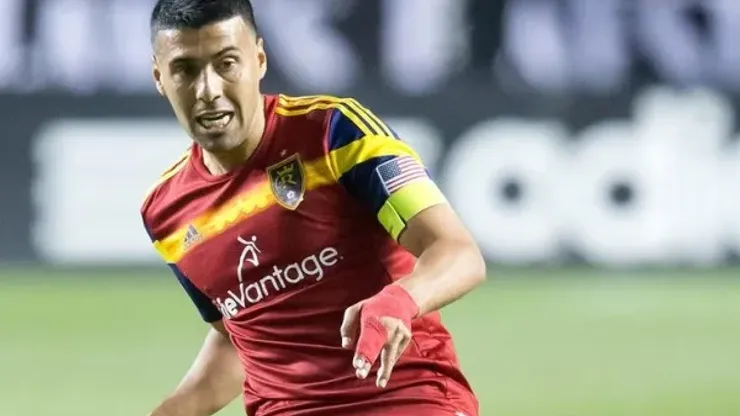
What if, instead of trying to bring in another David Beckham, Major League Soccer signed more players like Javier Morales? It wasn’t a hypothetical, though it was rhetorical. I was among a group of reporters gathered after MLS Cup three years ago when the question was asked by a league official. At the time, Beckham’s future was uncertain, and although the league’s commercial messiah he would come back for one more year, the post-Beckham world was already taking shape.
How would Major League Soccer replace its biggest star? To their credit, MLS recognized Beckham was unique. After all, Thierry Henry was brought in to create a similar buzz on the other coast and came up short. The league he realized the singularity of its biggest star, and while finding another Beckham would be nice, it also wasn’t an option. Besides, Beckham had served his purpose. The league’s profile was higher than ever, both domestically and abroad. While that didn’t guarantee fans would flock to the product, it did assure eyeballs.
People willing to give the league a chance had probably already watched a game. Those who’d stuck round were doing so for something beyond Beckham. That something was the product. The league knew it. They knew the quality of play needed to improve, a realization that came while economic conditions in South America meant established talents were willing to look north of Mexico. Thanks to players like Seattle’s Fredy Montero and RSL’s Morales (among others), MLS had a series of success stories that allowed them to sell a new, more stable career to Latin America’s talents. It was a competitive advantage, one that would allow the league to make up ground. That Morales would be the archetype instead of a Beckham or an Henry may seem strange, but consider what the Argentine has done in Salt Lake.
Now 34, the former Lanus, Arsenal, and Newell’s Old Boys midfielder has spent seven years in Utah. During that time, he’s averaged 6.6 goals and 12 assists per 34 games, helping RSL to two conference titles and the 2009 MLS Cup. Along the way, he’s become one of the most respected players in Major League Soccer, one often evoked by peers discussing the league’s most skilled players.
Those skills became part of the bedrock of a team that prides itself on possession soccer. During a time when speed, strength, and athleticism were still the dominant traits in the MLS, RSL turned to players like Kyle Beckerman, Will Johnson, Andy Williams, and Robbie Findley. The team’s big advantages — strong scouting; the emergence of head coach Jason Kreis; an expertly executed 4-3-1-2 system; and, the orchestration of Javier Morales – helped turn a small, expansion market into a success, one built on its attractive product.
What if, instead of following the Galaxy’s Beckham example, the league targeted a new group of skill players? An infusion of players just like Javier Morales? Instead of focusing on a single name that would hold national attention, the league could try to convert its new, casual fans into loyal disciples. What if MLS gave its on-field product a big push? Over the past two years, that question has been answered. Establishing a presence on the ground in Argentina — one that’s helped the league connect with clubs, players, agents — MLS has opened the flood gates, the occasional transfer fee from the league’s shared coffers helping a series of new playmaking talents land on North American soil. Columbus’s Federico Higuain was one of the first to come in 2012. Portland’s Diego Valeri came the next season, with FC Dallas signing River Plate-trained Mauro Diaz to a young Designated Player deal that July.
This year, Cristian Maidana has joined Philadelphia, while Matias Perez Garcia moved from Tigre to San Jose this summer. And that’s just the playmakers. Vancouver’s Matias Laba has shown the potential to be one of MLS’s best defensive midfielders, and attacker Ignacio Piatti was invigorated Montreal since his move from San Lorenzo. Real Salt Lake hopes newly-signed forward Sebastian Jaime can help them navigate a treacherous Western Conference, while even with less celebrated talents like Andres Romero (Montreal) and Maximilliano Urruti (Portland) help raise the league’s level.
Though detractors still evoke stereotypes of overly-direct play, the skill the league’s injected over the last two years has led to a much-improved product. Sunday’s game in Portland was an example of that payoff. A game between the Timbers and Earthquakes might not otherwise hold a neutral’s attention (they’re fifth and eighth in the West), but combine Valeri’s talents with San Jose’s counterattacking approach, and you have a recipe for six goals, 44 shots, and 17 attempts on target. And on an individual level, you get three assists, nine shots, five shots on target, and 12 chances created from a player who has become the poster boy for MLS’s Argentine infusion.
It’s not the only way MLS is trying to improve, and as Guillermo Barros Schelotto’s success in Columbus shows, Argentines didn’t suddenly start making an impact two years ago. But in heightened quality the league’s seen since targeting the Primera, MLS has answered its own question. What if the league forgot about a new Beckham and targeted more Javier Moraleses? In two years’ time, MLS would see a huge payoff.
200+ Channels With Sports & News
- Starting price: $33/mo. for fubo Latino Package
- Watch Premier League, Liga MX & Copa Libertadores
The New Home of MLS
- Price: $14.99/mo. for MLS Season Pass
- Watch every MLS game including playoffs & Leagues Cup
Many Sports & ESPN Originals
- Price: $10.99/mo. (or get ESPN+, Hulu & Disney+ for $14.99/mo.)
- Features Bundesliga, LaLiga, NWSL, & USL
2,000+ soccer games per year
- Price: $7.99/mo
- Features Champions League, Serie A, Europa League & EFL
175 Premier League Games & PL TV
- Starting price: $7.99/mo. for Peacock Premium
- Watch 175 exclusive EPL games per season






